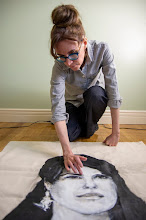“…two hipster wannabe artists in pre-millennial Chicago
falling in like/love…”
On Monday, I chickened out. For the first time this winter,
I left my car downtown and took the bus to campus up the big, imposing (at
least to those of us driving standard) hill because I was shaking after driving
20 kilometres below the speed limit on packed snow. When I got home, I made a
cup of tea and told my husband, “I just want to read my book and forget about
winter.” But what was the first sentence in Joe Meno’s Office Girl (2012, Akashic Books), which I got through interlibrary
loan that morning? “Anyway it’s snowing.” Sigh.
‘Sigh’ sums up my reaction to Office Girl. This is not to say the tale about two hipster wannabe artists
in pre-millennial Chicago falling in like/love (depending on each character’s
perspective) is not enjoyable, but it is a downer. Their lives are unenviable
(they live in crummy apartments and meet in a small Muzak call centre) and
their emotional states are unstable, so you just know there is not going to be
a happy ending.
The first chapter follows Odile’s life and the second
chapter follows Jack’s life. The urge for them to meet demonstrates how wired we are to want romance in books, films and real life, even when it is a bad idea. These two should
not get together. Odile, who has been spurned by a married man, desperately
avoids love because she’s a pessimist. Jack, meanwhile, should be a pessimist
because he’s getting divorced at the young age of 25, but he’s
desperately seeking love. Time could be on their side if they had a chance to
heal and mature, but Odile is hell-bent on moving to New York.
If I weren’t an artist, this book would make me feel
seriously irritated about art, because I would probably confuse art with
self-involved artists. Reading sentences like “Odile announces that what
they’re really missing is a manifesto” (p. 193) make me clench my teeth. The
brazen Odile invites Jack to be part of a two-person art movement that does
outrageous things in public like wearing ghost costumes. They are intoxicated
by their nonsensical collaborations, probably because on their own, they were blocked. Jack, an art school graduate, has done nothing with a stack of tapes
made over four years with a handheld recorder of everything from the sound of a
tiger roaring at the zoo to the silence of a glove lying in the snow. Odile
admits that in art school, when she made things like a penis-shaped lamp, her work
felt useless. After dropping out, she graduates to defacing posters with
x-rated graffiti.
Although clearly interested in sex, Odile resists intimacy with Jack. The majority of their relationship is spent skirting romance, which makes for a rather charming friendship where creativity attempts to mask sexual tension. When they consummate their relationship, it’s the best four days of Jack’s life, but it’s the beginning of the end for Odile. Once Odile packs her bags, all Jack is left with is a sketchbook he bought at her garage sale and a dirty magazine they made with self-portraits. Its title, scrawled by Odile, is ALPHONSE F. IS IN LOVE. Alphonse F. is their shared alter ego (like the non-sound of a glove in the snow, it is a source of potential irritation to the reader), but it’s hard not to feel touched by her admission of love, however quirky and fleeting.
Although clearly interested in sex, Odile resists intimacy with Jack. The majority of their relationship is spent skirting romance, which makes for a rather charming friendship where creativity attempts to mask sexual tension. When they consummate their relationship, it’s the best four days of Jack’s life, but it’s the beginning of the end for Odile. Once Odile packs her bags, all Jack is left with is a sketchbook he bought at her garage sale and a dirty magazine they made with self-portraits. Its title, scrawled by Odile, is ALPHONSE F. IS IN LOVE. Alphonse F. is their shared alter ego (like the non-sound of a glove in the snow, it is a source of potential irritation to the reader), but it’s hard not to feel touched by her admission of love, however quirky and fleeting.
Image: reproduced in 2019 via fair use/dealing. Source: http://www.akashicbooks.com/catalog/office-girl/

